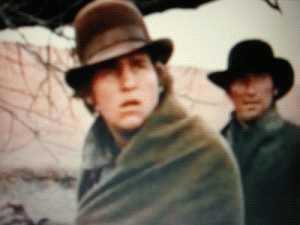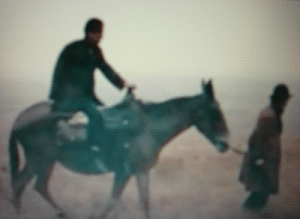 Bad Company, 1972. Directed by Robert Benton, written by Benton and David Newman. Starring Barry Brown, Jeff Bridges, John Savage, Jerry Houser, Damon Cofer, Joshua Hill, and the great character actors David Huddleston, Jim Davis, Ed Lauter, John Quade, Raymond Guth, and Charles Tyner.
Bad Company, 1972. Directed by Robert Benton, written by Benton and David Newman. Starring Barry Brown, Jeff Bridges, John Savage, Jerry Houser, Damon Cofer, Joshua Hill, and the great character actors David Huddleston, Jim Davis, Ed Lauter, John Quade, Raymond Guth, and Charles Tyner.
Last summer, when The Hurt Locker was garnering all sorts of praise and little box office, some film critic, whose name I don’t recall, noted that the current slate of war films was unique in history. This fellow noted that until this war, films critical of war, or deathly realistic, simply didn’t come out while the war was still being fought. The Deer Hunter, Coming Home, and their ilk were all released after the Vietnam War, and of course there were few, if any, movies critical of World War II or Korea. Perhaps this is attributable to the fact that we were, as a nation, very much in support of WWII and Korea, and at the start of Vietnam, while the “police action” raged and had moderate support, crap like John Wayne’s The Green Berets did stellar box office. This war’s films, however, have yet to find an audience. Why, I wonder? Could it be… because we don’t have a draft? Consider the past… and Robert Benton’s Bad Company.
Bad Company is a Western, an “acid Western“, according to film critics (a term barely used when it was coined fifteen years ago and never used in the 70s), which means that it has the usual tropes, mixed in with some of Sergio Leone’s spaghetti sauce, and usually deeply critical of America. Despite being a Western, Bad Company is really a Vietnam war movie, taking place during the Civil War. It was a flop, for reasons probably having less to do with its message or acting or plot, and having more to do with the fact that Americans pretty much loathed Westerns in the 70s. I don’t think there was a single successful one that decade.
The plot: with the support of his sweet, devout Methodist parents, young Drew Dixon (the tragic Barry Brown) flees the Union Army, who are out rounding up draft dodgers, including many young men dressed as women (to avoid detection.) With a hundred bucks in his pocket, Dixon heads into the nearest town to take a stagecoach west, beyond the jurisdiction of the United States Armed Forces, and where he hopes to earn a fortune in silver mining. He is resolved to live a good, honest life, and we’re privvy to his naive thoughts as his diary serves as narration.
While waiting for the stagecoach, he is robbed by Jeff Bridges’ Jake Rumsey, a kid on the lam himself. Well, Dixon catches up with Jake, and falls in with a rag-tag band of misfits: a pair of brothers who themselves are fleeing from the Army, Loney and Jim Bob (John Savage and Damon Cofer); Simms (Jerry Houser), a young coward running from his father; and, Boog, an almost feral child whose Dad was lynched for rustling (Joshua Hill Lewis). After pooling that day’s thefts, the crew sets out West and the good life. As Jake says,”That’s our racket for you, livin’ off the land.”
Of course, nothing goes right. But in this case, not only does nothing go right, it seems there’s a vast, almost existential nothingness meeting them on the prairie, as if the good old American promise of “Go West, young man” has become nothing more than a lie. Here, the west is bereft of food, water, or any means by which one can make a living. Quickly we see the humor that opened the movie drain away, like blood into sand, and with equal swiftness we see how vulnerable these young men are, and that they’re hardly men, children, really.
Robert Benton and David Newman were famous for writing Bonnie & Clyde, and here they’ve trained their cynical eye on the Western, and in doing so wrote a crack metaphor for Vietnam. We see the boys riding against a dull horizon, with nothing to offer them. Along the way they kill a rabbit (having to waste dozens of bullets as the line of young men fires at the poor beast, failing to kill it until they’ve emptied half their chambers), but are so disgusted by dressing the animal they refuse to eat it. (One nitpick: young men–hell, children–knew how to slaughter chickens and rabbits a’plenty back then. Pretty much everyone, even city dwellers, dressed their own game.) When they come upon a farmer and his wife, the couple explains that they’re leaving the West–there’s simply no opportunity. Then the farmer gleefully offers his wife to them as a prostitute–”Eight dollars for the bunch of you!”–and she is equally happy to get the money. It’s hardly sexy, and stealing, the fucking, the living, is hellishly banal.
There’s little excitement in Bad Company, little robbery, but a lot of begging and stealing and eating things like skunks. In fact, it’s the robbery of a hot pie that results in tragedy. The film does suffer a bit in terms of its overall narrative. Clearly wholesome Drew Dixon is our catalyst, whose story serves as an arc. He avoids sleeping with the prostitute, claiming he’s from “good stock”, keeps his folks’ money hidden even when he’s starving, and refuses to participate in robbery. His eventual spiritual and moral collapse should move the story forward more, but it’s leavened with too much humor, which is appropriate, say, in the broad Little Big Man, but comes off half-assed here.
Benton and Newman don’t really know what to do with Dixon, nor do they take his piety far enough, and close with what really amounts to a joke, when tragedy is required (as in the gun battle that closes Bonnie and Clyde.) For once I would have loved to have seen a Christian pushed to the limits by an unjust war and bleak conditions, and not some square whose greed brings him around.
No matter, because Jeff Bridges’ Jake and the rest of the boys (especially Boog) are compelling people who we will follow clear across the continent. And it is their story, and Drew’s (for Barry Brown is very effective), that makes us understand the tragedy of war, even on the home front.
Bad Company speaks to a lost time. It speaks about the Civil War specifically, and the Vietnam war metaphorically, and in the years since war in general. And how bad wars and the draft that fuels that engine can turn good men into criminals. Every one of these young boys, rough though most of them are, would have probably been farmers had the draft not forced them to flee. Fleeing, in turn, forces them to become criminals. Only one, the very young Boog, is the product of a thief. And when these starving young men face a band of true thieves, well, the result is not surprising, but exciting nonetheless. We’ll just say that necessity is the mother of invention.
But it also makes me wonder if we weren’t better served with that horrible draft. There is no question that the draft is awful, and it’s a bit remiss for a man such as myself who avoided the first Iraq war, to urge a draft to haul young men across the world to Baghdad or Kabul. However, what the draft did was to make it so that young men, all young men and not just the poor, disenfranchised, and voluntarily gung-ho, had to either be a part of the war or run to the hills (the hills, of course, being Canada). You couldn’t stand by on the sidelines during Vietnam, because if you hadn’t been there, you knew and cared for someone who had.
Bad Company is about this time period, one that must seem as distant and alien to young men today as the Civil War did in 1972. The youth of today don’t have to protest, and aren’t drawn to war stories, or tales people like themselves fleeing the Army in the rough West. And that’s because in today’s America a war can rage thousands of miles away and it affects them about as much as the World Cup.
So watch Bad Company and think of the war. This war, the one we have stopped reading about for the most part. Think of the young men and women joining and re-upping again and again because of a deep and profound sense of needing to be there, when others will not fight. And wonder to yourself: can there ever be another Bad Company? Will we ever make Westerns that speak to the present day as urgently as they did then?

